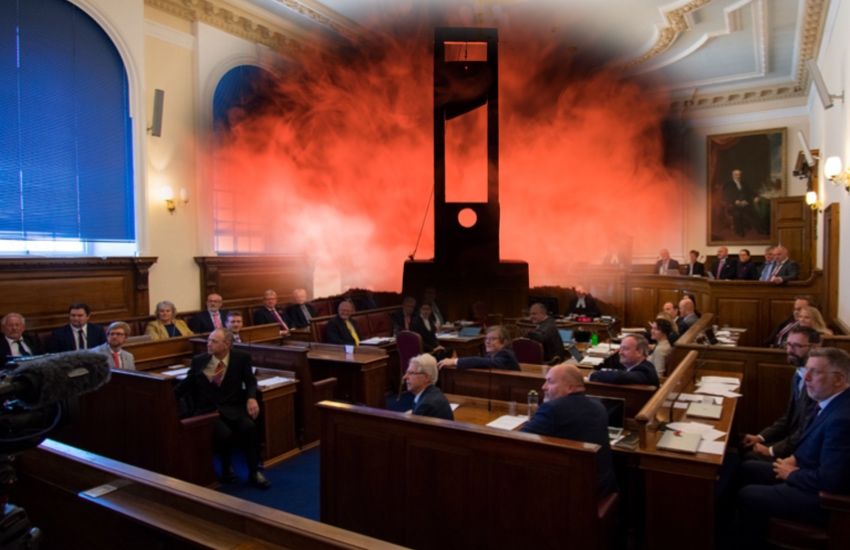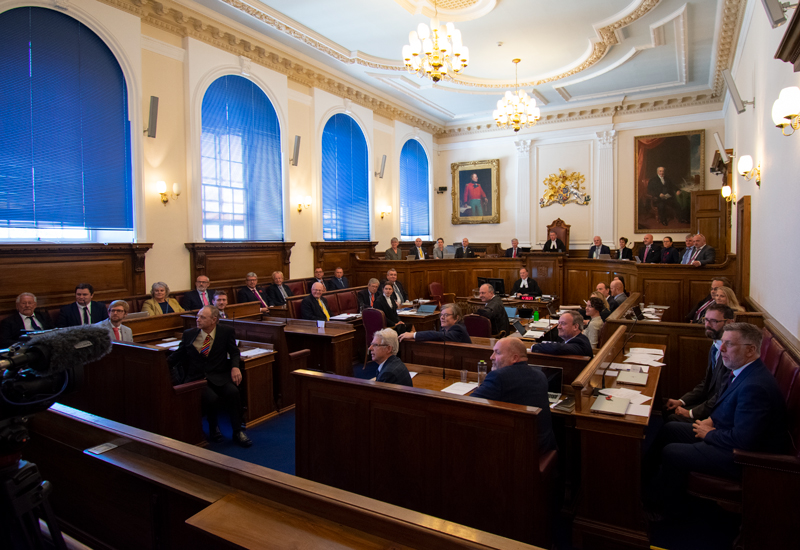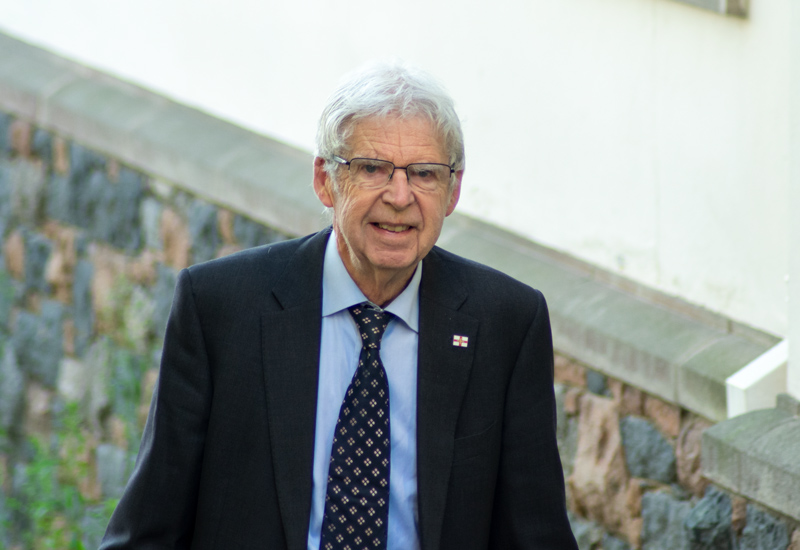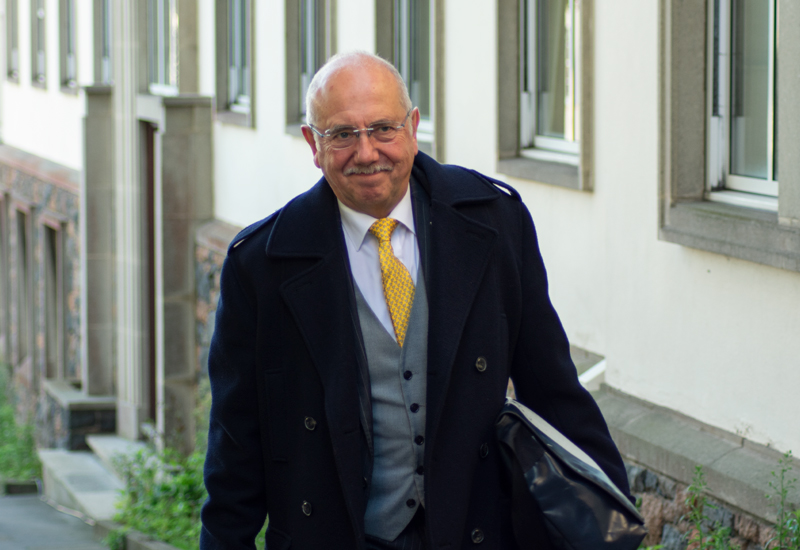


Unless you spend all day listening to each States’ debate or choose to sit inside the chamber – as is your right – to watch the proceedings from the public gallery, much of what happens during debate gets buried under the headlines. And while the headlines are important, it's the existence of the guillotine that got deputies talking over the weekend.
There were several important decisions made last week, including the approval of a new Reciprocal Health Agreement with the UK, the reform of the Matrimonial Causes Law and the defeat of a requete lodged by Deputy Steve Falla to protect a green field in the grounds of the Princess Elizabeth Hospital.

Most of the political noise generated last week revolved around the contentious issue of the requete. However, this noise was relegated to debate triggered by Deputies Neil Inder and Mark Helyar, who successfully lodged an amendment that now forces the States to develop a field elsewhere if planning permission is approved for that field.
Any further general debate was curtailed, after Deputy Dave Mahoney lodged a motion under rule 26.1 of the Rules of Procedure, colloquially known as the ‘guillotine motion’.
Rule 26.1 can be called by a deputy who has not already spoken in debate. That deputy can ask the Presiding Officer to bring debate to a close while still allowing the proposer of any amendment or policy letter to respond to the debate.
In the case of a requete, any Committee affected is given an opportunity for its President to respond.

When the motion is called, all members who are still entitled to speak and would like to speak are asked to stand in their places, and the deputy who called the motion is then asked if they would still wish to proceed. If they maintain their stance, a vote is called; and, if successful, the debate is closed.
Often this leads to several members being unable to deliver their speeches on a given topic. In the case of Friday’s requete on the green field, it was nearly all of them. Including all those who signed the requete.
Not only did the guillotine stop all but Deputy Lester Queripel speaking in general debate, but it was also claimed by several deputies that a large tranche of their colleagues got up to leave as soon as he started.
Deputies Yvonne Burford, Heidi Soulsby, Sasha Kazantseva-Miller, Lindsay de Sausmarez and Jonathon Le Tocq highlighted both issues via Twitter after the debate.
13 people, including the entire Guernsey Party, walked out when @Lindsay_Gsy stood up to speak.
— Yvonne Burford (@YvonneBurford) July 15, 2022
Standard parliamentary behaviours in this Assembly - curtailing debate and then exiting the room in exodus when certain members speak.
— Sasha Kazantseva-Miller (@sashakmiller) July 15, 2022
So States agree to guillotine debate when only 3 requerants had spoken. In fact it was requested when only 2 had but Acting Presiding Officer allowed those he had already called to speak.
— Deputy Heidi Soulsby MBE (@HeidiSoulsby) July 15, 2022
This is why I'm keen that States meetings are recorded visually, so the electorate can see the behaviours. There is a block of deputies who make a point of walking out every time I get up to speak, for example. This is not how grown ups should behave, let alone parliamentarians.
— Lindsay de Sausmarez (@Lindsay_Gsy) July 15, 2022
I have sought to speak five times in debate today & have suffered from the “guillotine motion” each time. I’m not complaining, I probably didn’t have much to add, just an observation.
— Jonathan Le Tocq ???????? (@letocq) July 15, 2022
Express asked all deputies for their opinion on the appropriate use of the guillotine motion and whether there is a reasonable expectation for deputies to remain in their seats while others are talking. Express received many responses, so strap in.
The first to respond was Deputy Lyndon Trott, who was presiding over the requete debate in lieu of the Bailiff and Deputy Bailiff, who were unavailable
“On very rare occasions, debate can develop in a manner where there are no new arguments being placed – so called tedious repetition,” said Deputy Trott. “On such rare occasions, a guillotine might be appropriate.
“I think there is, absolutely, a reasonable expectation that deputies should remain in the Assembly to listen to speeches, other than for comfort breaks and other refreshment purposes.
“There have been several occasions when members have left the Assembly, simultaneously and in large numbers. It is usually the same group and it is usually when one of two speakers are on their feet.
“There is a rule which states that members must act with decorum and respect at all times. It could be argued that on occasions this rule has not been maintained.”
Express understands that the two deputies he is referring to are Deputies Queripel and de Sausmarez.

Pictured: Deputy Andrew Taylor supported the guillotine motion and says far from stifling debate, it’s a useful tool for deputies: “In a real debate you don’t just repeat the same points, you constantly provide new points to challenge the opposition – that’s not what happens in Guernsey. The constant repetition of the same point could be deemed to stifle the debate.”
Despite the concerns raised via Twitter, most of the deputies voted for the guillotine motion and so, unsurprisingly, there’s plenty of political support for the democratic use of motion 26.1.
Deputy Marc Leadbeater said: “The many arguments from the requerants were played out over mainstream and social media on the run up to the debate, so I don't think they were in any way silenced.
“If all members had spoken, it would have not changed the outcome,” he said. However, he did admit that “this term some deputies seem to all need the toilet at the same time”.
The President of Policy & Resources Committee, Deputy Peter Ferbrache, said he could not think of any cases of a guillotine motion being used to stifle debate.
He did, however, suggest that there have been occasions where deputies have left a debate en-masse: “I think it should be exercised sparingly if members feel they can make an appropriate point by so doing; that is a matter for them - it is not something I would do.”

Pictured: “There are instances when the guillotine motion has prevented me from delivering my speech,” said Deputy David De Lisle, who said he has never called for one.
Deputy Bob Murray said if he thought the use of a guillotine motion would stifle debate “I wouldn’t vote on it”.
On walkouts, he said: “I doubt that you will find any 'en-masse' exits in the sense that they are in any way pre-planned.
“If any member still felt the need for additional input before making a decision other than the one they had just voted on [referring to the Inder/Helyar amendment debate], they of course might wish to reflect on the summing up.
“Personally, after three hours, having not exited the chamber, I was not in need of further input, but I cannot speak for anyone else of course.”
Deputy Murray is a member of the Guernsey Party, whose members were among those leaving the debate towards the end. Express asked the Guernsey Party directly for comment, but it chose for its members to reply independently instead.

Pictured: Deputy Al Brouard, said: “Three hours solid without moving an inch from one's chair in the chamber is, I think, an unrealistic proposition and would not be expected in any other work place without a comfort break.”
Deputy Simon Vermeulen saw no issue with the use of the guillotine motion or the walkouts. However, he did suggest that “certain members should work on their attendance records”.
Additionally, Deputy Sue Aldwell said she has never conferred with another deputy about leaving the chamber and cited the extremely warm weather as a reason for people leaving during debate.
“I try never to leave in the middle of a speech,” she said.
Deputy Lindsay de Sausmarez told Express that the use of the guillotine motion in any event is undemocratic.
“I would rather no one was disenfranchised in this way," she said. "Even aside from the important opportunity to influence the outcome of any vote, debates are also an opportunity for members to put their views on record. Guillotining debate denies them this.”
Deputy Sasha Kazantseva-Miller said the guillotine motion is increasingly being used as a political tool to shorten or completely cancel debate. Of the exodus claim, she said: “There is an increasing volume of deputies that appear to leave the chamber in some kind of exodus and more than once it seems to link to certain deputies speaking.
“A former deputy with a long-standing tenure with the States commented that this type of behaviour in the Assembly is unprecedented.”
Deputy Gavin St Pier also thinks that the guillotine motion has been used more extensively in this Assembly than previous iterations.
"It's apparent that many members regard States' meetings as rather pointless and a waste of time; a distraction to the real business of government. There seems to be little appetite to hear evidence or argument in debate."
He also said: "It does seems that there can be a mass exodus when some members start speaking."

Pictured: “I have never voted for a guillotine motion - in my view they're undemocratic," said Deputy de Sausmarez.
Deputy Simon Fairclough raised similar concerns to Deputy de Sausmarez and said there have been occasions where the guillotine motion has been used to stifle debate. He also thinks deputies walking out in large groups is inappropriate and unacceptable.
Deputy Mark Helyar said of guillotine motions: “If enough people disagree with it, it doesn’t get passed - that’s democracy.”
He also said “members come and go in the chamber all the time” and is unaware of “co-ordinated” departures.
Deputy Rob Prow concluded his thoughts on Express’ questions by saying: “I do not believe it is my job to dictate to other members on the decisions they make within the rules.
“We have a good States' Assembly and Constitution Committee who oversee the rules. I am confident that if they perceive that some rules are no longer appropriate, they will recommend changes to the States. I will leave that to them.”
The deputy who brought the successful guillotine motion on Friday, Deputy Mahoney, didn't reply to Express' questions today in the given time frame.
Housing on field "not a done deal"
SPEECH: "The requerants approached this debate with a straight bat"
Comments
Comments on this story express the views of the commentator only, not Bailiwick Publishing. We are unable to guarantee the accuracy of any of those comments.